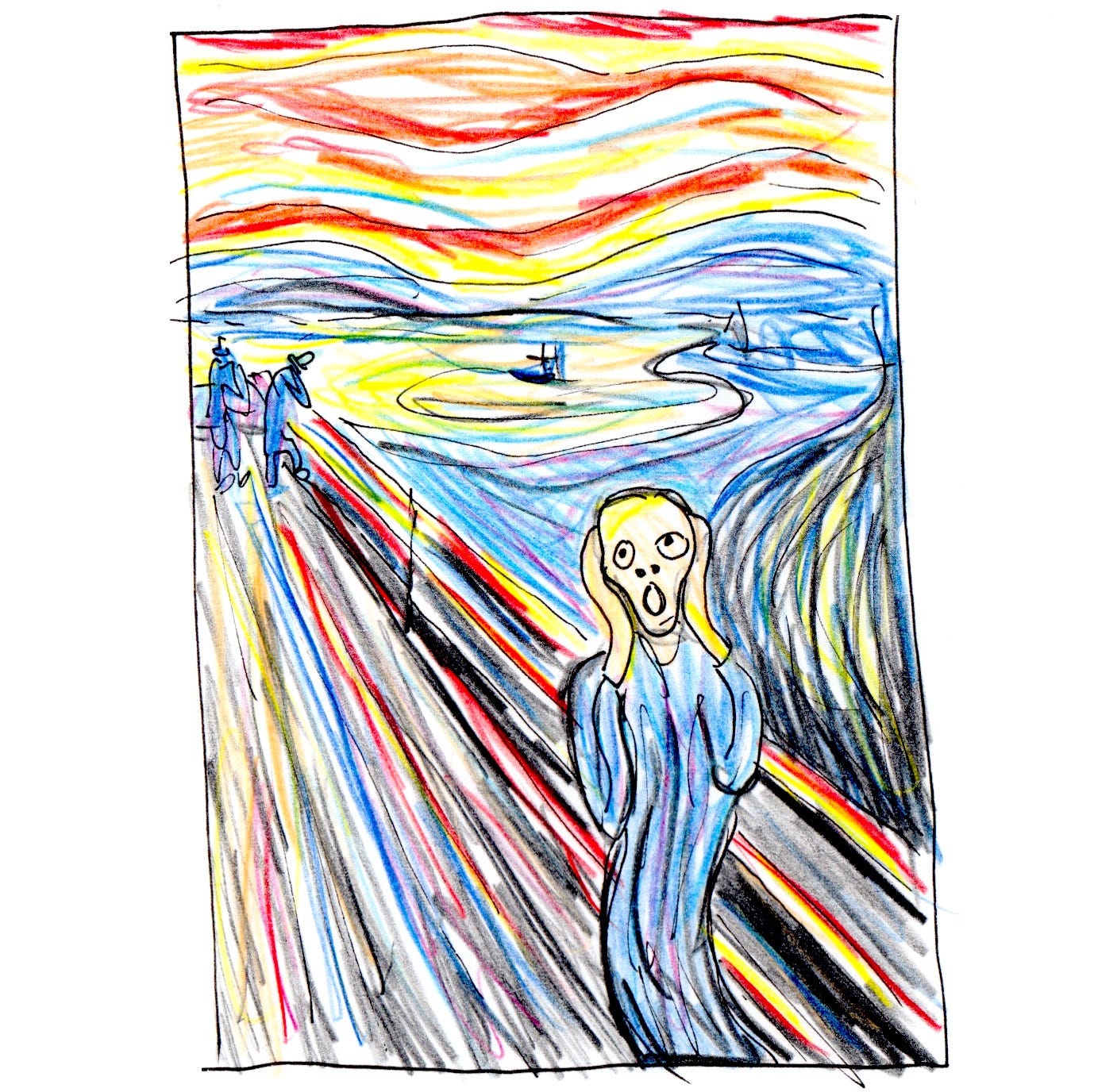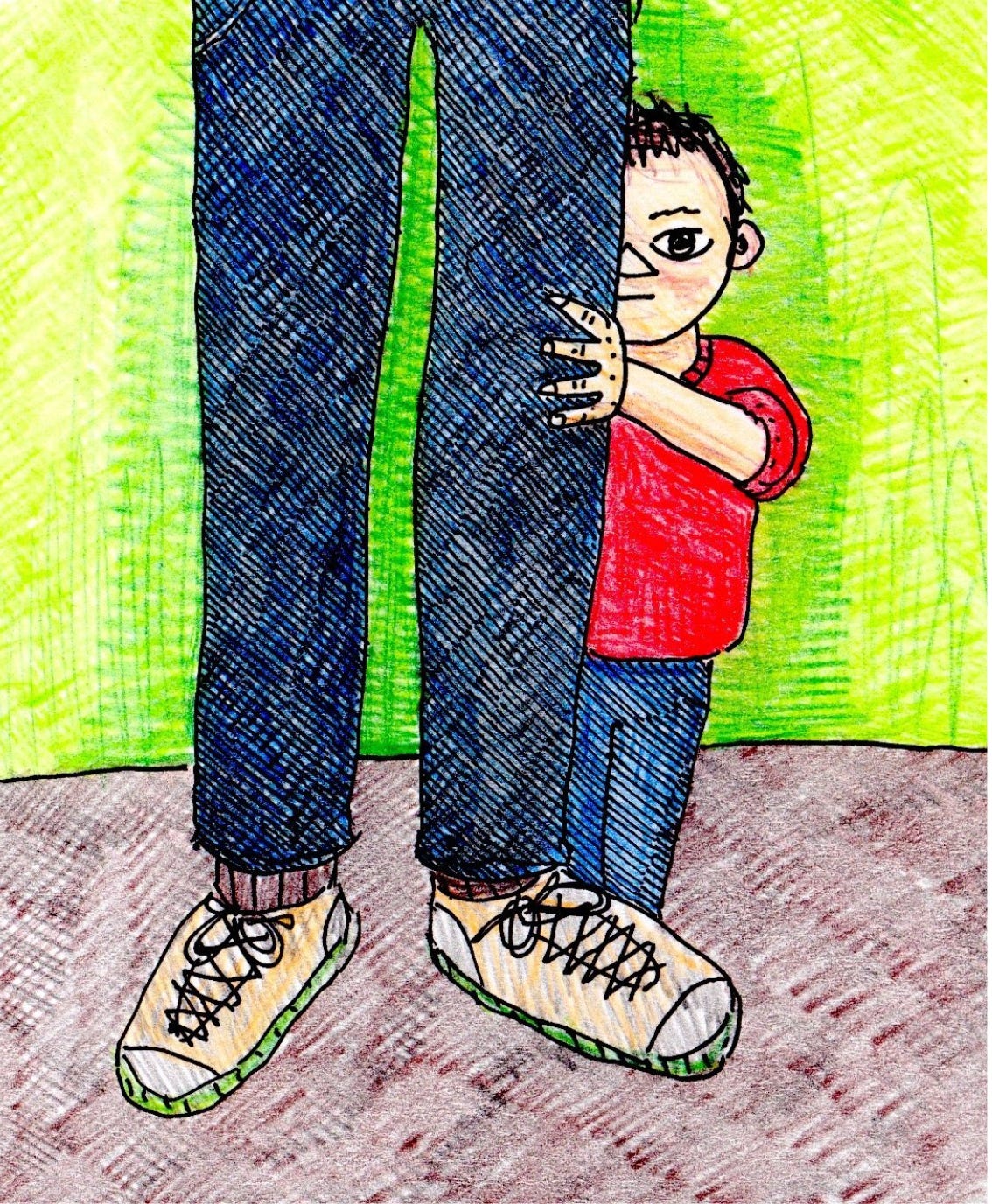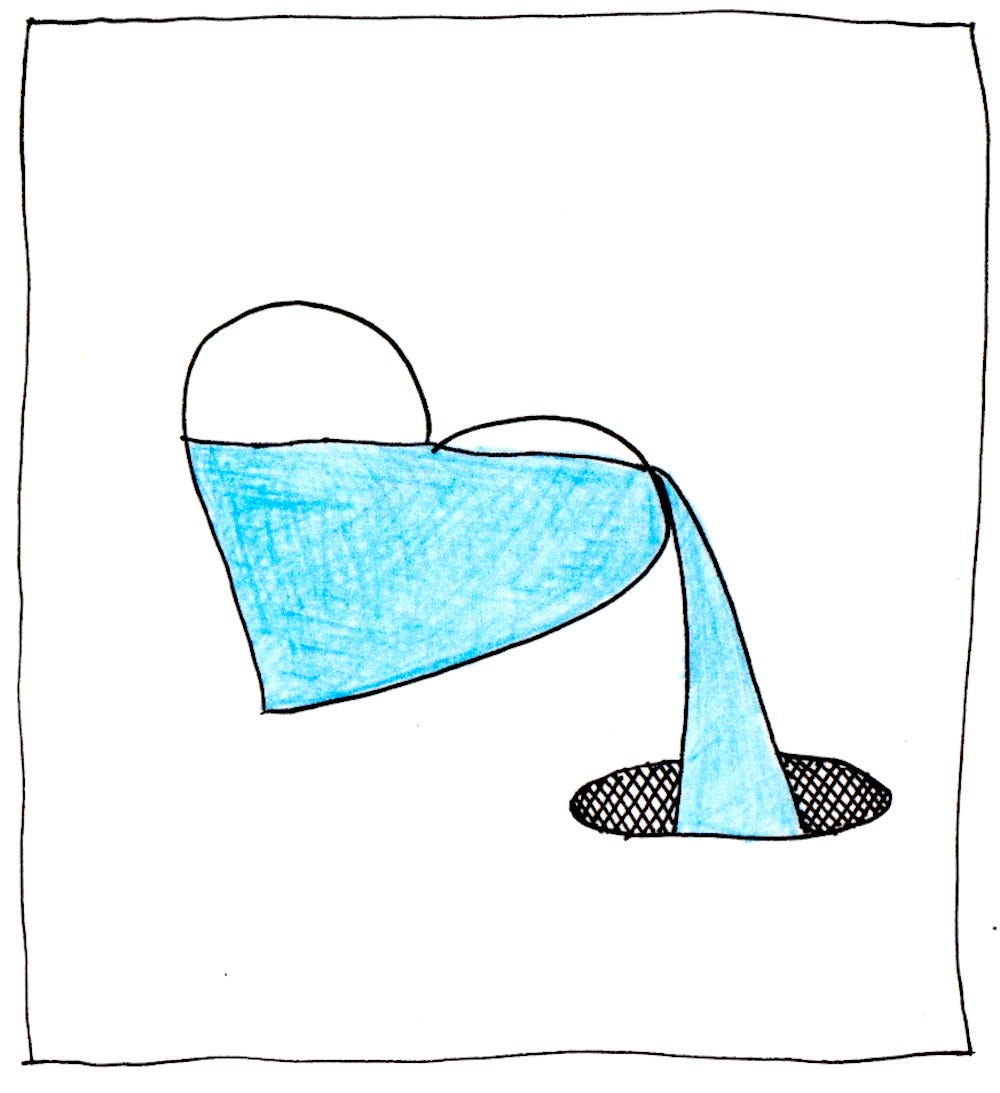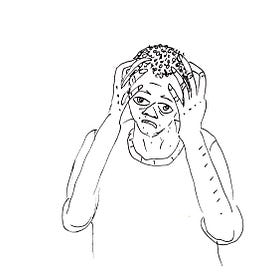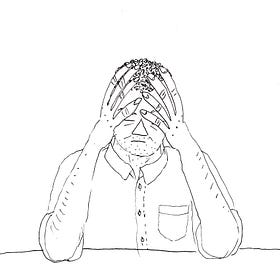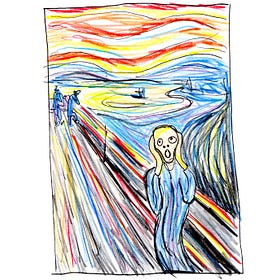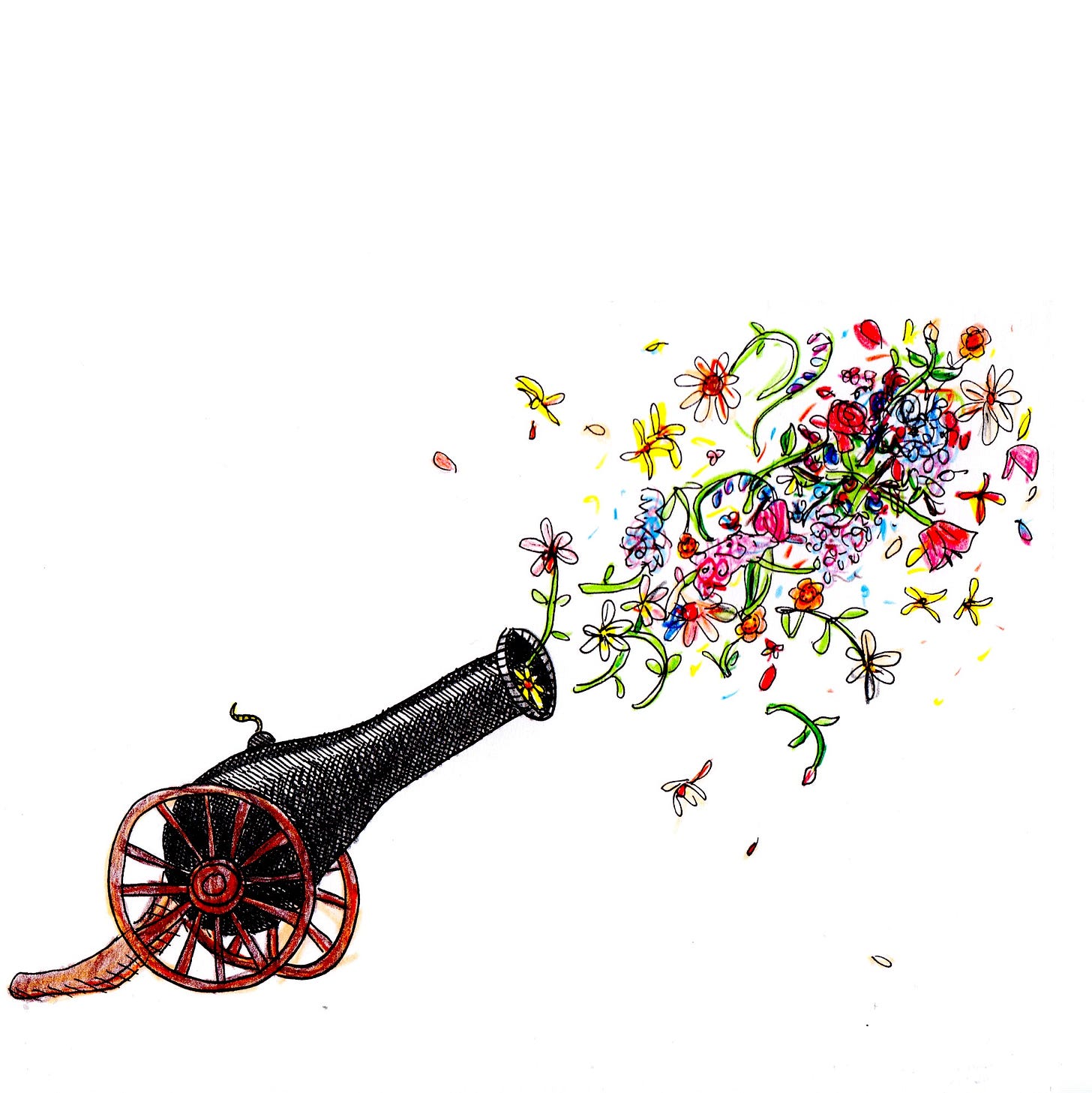Who Am I If I'm Happy?
More Men Who Are Afraid: With Ky Henderson, Wilson Sims, Wesley Lowery, and Kevin Koczwara.
This is the fourth installment of our “Men Who Are Afraid” series, where we ask writers for a few hundred words about their masculinity during this fractious, disorienting time period, where men are constantly trying to figure out if they need to pivot towards fist-fighting or crying in public or talk-therapy or sobriety: who are we supposed to be?
This month, we have stories about professional failure, fathers, more painful family shame, and, uh, snakes (kind of).
Below, you’ll hear from writers Ky Henderson, Wilson Sims, Wesley Lowery, and Kevin Koczwara about what makes them afraid.
Also, To commemorate our 7th anniversary and Recovery Month, we’re offering a 20% discount on all annual subscriptions throughout September.
If our newsletter has helped you feel less wicked and alone, less shitty or AFRAID, then please consider financially supporting us. Subscribers gain access to the entire archive, the Sunday essay, the complete recommendations roundup, and the comprehensive rundown of my weekly recovery program.
If you’d like to become a paid subscriber but can’t afford it at this time, email me: ajd@thesmallbow.com and I’ll hook you up.
Clear eyes, full hearts, etc. — AJD
(Or if you hate more email, hate Substack, but still love us, you can make a one-time donation here.)
Another reminder: We have a meeting today at 10 AM CALIFORNIA TIME/1 PM NEW YORK CITY TIME
FORMAT: CROSSTALK, TOPIC MEETING
We’re there for an hour, sometimes more. We’d love to have you.
Meeting ID: 874 2568 6609
PASSWORD TO ZOOM: nickfoles
Alright, let us begin.
Men Who Are Afraid Part IV
“The thought of me truly, genuinely moving through the pain feels as terrifying and unnatural as stepping off a building. I don’t know what defines me if it’s not my childhood.”
by Ky Henderson
For my entire adult life, I’ve been afraid of reckoning with my childhood. The fear has been omnipresent, but over time it’s metamorphosed.
In my 20s I was afraid to admit I even had something to reckon with. I knew I’d been affected by the abuse and neglect, but I believed the effect was minimal — funny, even. “My love language is maladaptive behavior,” I’d say to friends. Or, “The only emotions I ever feel are sleepy and hungry.”
When some fatal tragedy or accident in the news came up in conversation, I’d sigh theatrically and, gazing off into the distance to, wish it upon myself. But gallows humor, it turns out, does not erase trauma, and at 28 my life began derailing. I quit a dream magazine job in a spontaneous fit of pique and self-destruction. Suddenly a freelance writer, I did work offered to me but couldn’t pitch my own story ideas — my withering self-loathing tore them to shreds before they had even formed — and credit card debt mounted. My sleep schedule flipped and I began staying up all night and sleeping during the day; I vividly remember standing in my darkened kitchen one night and realizing I had neither spoken to anyone nor showered in almost a week. I wasn’t overcoming the terror of acknowledging the trauma so much as I was succumbing to the exhaustion of denying it. But at least it got me to therapy.
And so in my 30s the fear changed: I became afraid I would never get over it. The “it” being a mother with debilitating OCD and depression that manifested primarily in relentless cleaning of everything — including me. Being raised this way was exemplified by a nightly ritual: I wiped myself down with Lysol-soaked paper towels. Then I took a sometimes hours-long, always supervised shower that culminated with a literal bucket of Lysol poured over my head. Finally I was locked in my bedroom so I couldn’t get out and contaminate or be contaminated by anything. It was often punctuated by my mother’s emotional napalm — screaming, crying, raging — that eliminated any chance I had to feel my own emotions. So, eventually, I didn’t. My dad was aware of it all but chose to do nothing. My extended family regularly witnessed my mother’s erratic behavior but made no attempt to find out what happened when she took me home. I’d grown into an adult whose sense of self was built upon a debilitating belief: I was filthy, like garbage, but even more worthless. I dreaded an entire life lived like that.
Today, in my 40s and after a great deal of therapy, the fear has once again evolved: I now fear that I will get over it. On paper it’s progress; I’ve reached the point where I can acknowledge the possibility of a life less defined by pain. After a long estrangement from my parents and family, I’m now in pretty regular touch with my dad. My mother texts me sometimes, and while seeing her name pop up on my phone reliably sparks panic in me, I respond without ire. They have both acknowledged responsibility and expressed genuine regret for everything that happened, which has helped more than I ever would have guessed. But the thought of me truly, genuinely moving through the pain feels as terrifying and unnatural as stepping off a building. I don’t know what defines me if it’s not my childhood. I don’t know what protects me if not a rampart of seething anger. I don’t know how to answer a terrifying question: Who am I if I’m happy?
But at least I can now ask it.
*****
Over the course of his journalism career, Ky Henderson has exposed CIA wrongdoing, test-driven Ferraris in Italy, revealed internal crisis deliberations at the NSA, written an advice column for Cosmopolitan, and profiled pop culture icons such as Keanu Reeves, Shakira, and Kim Kardashian. He is currently an assistant professor of journalism at Loyola Marymount University in Los Angeles.
“I’m afraid I’m one of those guys who 'just doesn’t have it’ and lately I fear becoming okay with that.”
by Wilson Sims
At fourteen, Braves relief pitcher Mark Wohlers was a dishwasher on the midnight shift and feared his future would look the same. He had a helluva arm, though, and a couple years later he slipped into the 8th round of the MLB draft. By the mid-1990s, he was the closer for my Atlanta Braves. I was only single-digits old, but on the nights my dad didn’t smuggle me into the living room to watch past-my-bedtime games, I listened to the radio call. “You can go ahead and walk the dogs,” the commentator would sometimes say, “Wohlers is coming in to close it up.”
But in Game Four of the 1996 World Series, he gave up a game-tying (series-losing) three-run homer to the Yankees’ Jim Leyritz. It’s still printed on my eyelids, and it was the end of his Cinderella story. His ERA went from under two to twenty. The Braves sent him to the minors, but Wohlers got worse. He met with a psychiatrist, but his pitches kept hitting the backstop. Wohlers wasn’t just bad—he was broken.
“Some guys just don’t have it,” my dad said, and the Braves agreed. Wohlers was placed on the disabled list; his injury designation literally read Inability to Pitch. From then to now, Mark Wohlers has been a real estate agent—jumbotrons to yard signs.
Last year, I blew my own World Series. The journey began as improbably as Wohlers’s, and I got closer than the smart money would’ve bet, but everyone with a printer passed on the book I gave everything to. In the immediate aftermath I thought I’d survived. I was still here: brushing my teeth, laughing at jokes, stopping at stoplights. But for all the typing in these last ten months, nothing’s been written. I can’t begin and finish a page: I’ve got the yips. I’m afraid I’m one of those guys who “just doesn’t have it,” and lately I fear becoming okay with that. Last week, instead of sending pitches to editors, I binge-watched Black Rabbit. Yesterday,
Instead of writing, I took my dog to the park. Mark Wohlers says he’s happy—and to my horror, I can see how it happens.
*****
Wilson Sims work can be found in VQR, Witness, and Longreads,
and he writes a Treatment-Seeking Guide for Families.
“My family pushed me to accept that those who love me truly do love me. Friends insisted, brilliantly, that I drink more water.”
by Wesley Lowery
August 22, 2025
Washington D.C. —
Earlier this summer, I sent my father an essay about some of my memories. Dad asked if we could start discussing it. For two months, I was too afraid to respond.
I’m afraid of the military currently occupying my city and that the hotel my father has booked, for his visit on Friday, is in the touristy blocks near the Air and Space Museum, which are full of checkpoints and protests and arrests. I’m anxious to pick someplace safe, for both our feelings and bodies, for us to talk. And I’m afraid of the conversation we intend to have.
Everything I’ve learned in therapy has been infuriatingly obvious in hindsight—which then prompts the shame of, repeatedly, learning things you should have been smart enough to know already. Words you could hear and analytically understand but could not internalize and thus did not know; lessons that, at least, should have learned in less hard, destructive ways. Then my therapist had to introduce me to the concept of self-forgiveness. My family pushed me to accept that those who love me truly do love me. Friends insisted, brilliantly, that I drink more water.
Other things learned too late for my liking: 1. How much our addictions — to substances, technologies, each other — grow as balm for discomforts and refuge from fear. 2. How much of my fear, as a man, is of other men. Men who commit muggings and men who send armies in response. Men and boys who inflict violence when they feel scared or abandoned or otherwise inclined to respond to our cruel world in kind. 3. How this taught me a toughness that strangled my range of emotions, until at times, what remained was a thick calice of avoidance, anger and abandonment. 4. How, for generations, we’ve bequeathed this curse, from father to son.
On Friday, I’ll leave my house, pass the monuments and tourists and then armed men with their guns, until I arrive at the hotel lobby where I’ll find my father. I fear that some ruptures run too wide to be bridged. I’m afraid that attempts at repair will lead to rejection, abandonment, betrayal. I’m afraid of what that will make me feel about myself, the negative cognitions it’ll further reinforce. I’m afraid that sitting together with my father, and filling the holes in each other’s memories, will prompt unamendable feelings that will be impossible to process. I fear more pain will be required in order to repair. I hope I’ll be willing to try it anyway.
*****
Wesley J. Lowery writes the Substack Mosaic Theory. More of his work can be found here.
“The fear of what is lurking around a corner is more about not knowing.”
by Kevin Koczwara
It happened on one of those beautiful New England days: the sun shimmered through leaves as its afternoon light faded and the temperature climbed down. I don’t remember the season, per se, but I remember the sun and the browning grass. I know it was a few years ago because my children were smaller and we hadn’t yet moved. We were walking on a trail I’d picked for that afternoon, forced out of the house because my wife had another Zoom meeting and there could be no threat of a temper tantrum from another room or the backyard.
While walking I searched the sky for a hawk I’d spotted. We were discussing what birds of prey eat, how they have amazing sight and can swoop down on a rodent and scoop them up, a rabbit even. And then I jumped. I screeched, a high-pitch yelp that could only have come from a prepubescent boy and not a 30-something-year-old man who took care of a pair of children. I had almost stepped on a simple Garter Snake, a harmless animal, who had slithered away to safety into the brush. My heart raced. My children laughed.
“Why are you scared of snakes, dad?” my daughter asked. Her younger brother wandered ahead, peering into the woods in the hopes of seeing the beast.
“I don’t know.”
“They’re cute.”
“They don’t have any legs.”
That’s the best answer I have.
Snakes move and strike with grace and ease and, yet, they don’t have feet. They slide. They SLITHER. They seem to pop out of nowhere. And I’m afraid of them because I can’t seem to understand them. I can read about them, watch documentaries about them, I can spend hours watching all the “Planet Earth” volumes and still feel grossed out by them. They’re unknowable to me.
But isn’t that how fear works?
The fear of what is lurking around a corner is more about not knowing. The great horror movies don’t let you see the horrible thing for as long as you can take it — or as long as the director can hold off on using their special effects team. It’s why it’s so hard to sit still in a moment of quiet: we don’t know where our minds will go. We find comfort in the doom scrolling and our phones because they give us predictable answers. Algorithms work because they put us at ease. Same goes for superhero movies and why people vote for politicians who tell us we don’t need to change. It’s why my real fear is dementia. I make jokes about pulling the plug if I start to lose my memory, my mind, because I don’t want to live if the world isn’t as I knew it, if I forget the ones I love and lose the ability to live on my own. That’s an unknown I hope to never experience.
Or maybe my fear of snakes goes back to my childhood and when I first watched the Indiana Jones movies. I loved Indiana Jones and especially watching the movies with my father. Jones symbolized a hero who looked and acted normal. He wasn’t buff or superhuman. In fact, it’s his flaws that make him relatable, more human. And I loved the opening of the first movie, “Raiders of the Lost Ark” You know the scene, the one where Harrison Ford playing Jones, is chased by a giant ball after getting his artifact, is hunted by men shooting poisonous darts out of blowguns, losing the Golden Idol to his rival archaeologist, and finally swimming to safety on the seaplane to find Reggie, his pilot, Jock’s, pet. “I hate snakes, Jock! I hate ‘em!” Jones shouts as the plane ascends to safety.
The scene made me laugh as a kid and again when I watched “Raiders of the Lost Ark” with my children recently. They laughed too because they saw their dad’s fear in Ford’s face, in his screams about a snake. The shrieking. What gets me now is how Jock responds to Jones. I understand the joke and now and see the truth in it, see that it’s about more than snakes.
“Come on!” Jock says. “Show a little backbone, will ya!”
*****
Kevin Koczwara is a writer in Massachusetts whose work has appeared in Esquire, GQ, New York Times, Boston Magazine, and Deadspin (RIP).
MORE FEARFUL MEN:
More Men Who Are Afraid
My biggest unequivocal fear? I wish it were something cliché, like my daughter dating, or my son growing up to be a Lakers fan. But no. It’s that I’ll be the weakest link, the first in countless generations of Arab Muslims to raise kids cut off from where they come from.
What It's Like to Be a Fearful Man
My fear is very deep and multifaceted. It’s hard to narrow it down to what I am most afraid of. Vulnerability is challenging for everyone, especially men since we are taught from a very young age that it’s a sign of weakness. Yet, my fears go deeper than exposing myself as vulnerable or weak. It’s more a fear of the unknown.
To the Man Who Is No Longer Afraid
Sometimes military jets rumble through the sky, and on those days, I think, once and for all, "Here comes the war." And if I'm downstairs or in another room, I hurry into the kitchen and nervously look toward those flags. "Take those down," I think. "They'll see us."


